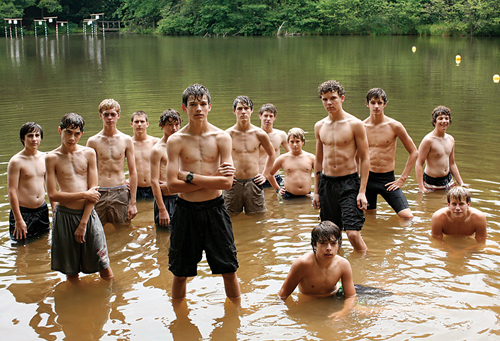Axe Effect | Chick Bait or Confidence Builder
/In June 2008 I wrote on Sexy Futures (moving to A of C):
I find the Bom Chicka Wah Wah Axe videos infinitely more creative, funny, sexy, humanly real-world clever than any production coming out of the Victoria’s Secret organization. Anyone who thinks I don’t have a sense of humor … hit play and Wah Wah on!
At Vassarette we did a Bom Chicka Wah Wah fashion story for Walmart. Yes, I suppose I should be tarred and feathered as a card-carrying feminist, but I find the videos empowering, as a woman who ‘owns’ her sexuality.
AXE - Bom Chicka Wah Wah
Our interest in the Bom Chicka Wah Wah Axe videos was for young, funny college-age women. At no time we were thinking about 15 year-olds, who honestly never entered into our conversations. We had our own Vassarette ‘Pink’ line for her, one not one as grownup as VS Pink.
When the Dove Campaign broke a few years ago, Unilever got slammed for being hypocritical about women, given their ownership of Axe.
Simply stated, I don’t agree with the Unilever criticism, but I understand my vulnerability to accusations that I’m endorsing women as sex objects in Axe commercials.
Talking Axe (or Lynx in England), this story is actually about boys — young men, who are ‘coming of age’, meaning learning about girls and more importantly growing into their own skin and identities.
In 2007, the Bom Chica WaWa gave boys a taste of their own medicine, posing as construction workers and cat calling young men.

Part of the discussion about age, sexuality and young male immaturity asks why marketers like Axe are targeting boys 10-14. Learning more about the increasingly miserable lives of teens, I imagine Axe answering “because young boys need all the help in promoting self-confidence that we can give them.”
In reality, this is another of those chichen and egg merchandising challenges, and corporate interests can’t be eliminated from the conversation.
Mothers and Teachers
Back in 2006, teachers in England wre bemoaning the ‘Lynx’ effect, complaining that the scent among 13-year-olds is so strong that they’re forced to open windows in classrooms.
One teacher commented: “My son is in Year 9, and reeks of the vile stuff. Is Year 9 when they discover girls?”
Another in her early 20s wrote: “About a year ago I made my boyfriend stop using Lynx because he smelled like a Year 9. It took a bit of persuading.” via Guardian UK
This weekend’s NYTimes picked up the Axe effect on For Tween Boys, Masculinity in a Spray Can, arguing that useage among tweens is escalating.
Boys themselves, at a younger age, have also become increasingly self-conscious about their appearance and identity. They are trying to tame their twitching, maturing bodies, select from a growing smorgasbord of identities — goth, slacker, jock, emo — and position themselves with their texting, titillating, brand-savvy female peers, who are hitting puberty ever earlier. via NYTimes
Females continue to reign large in the Axe commercials, but the Bon Chica Wa Wa girls are gone.
 Does the Axe young lad fantasy treat women as sex objects? Perhaps. But originally, the girls were on the offensive, which may more correctly describe the looming presence of teen and tween girls in young men’s lives.
Does the Axe young lad fantasy treat women as sex objects? Perhaps. But originally, the girls were on the offensive, which may more correctly describe the looming presence of teen and tween girls in young men’s lives.
In July 2007 TIME presented a generally positive, ‘they’re OK’ story about young men, although it was largely anecdotal, observation, short on statistics and written from ‘dad’s’ point of view.
For all those young women described in surveys as sniveling creatures on their knees giving young boys blow jobs on command and suffering verbal abuse in the process, the Axe story gives a different vision of young womanhood.
It’s challenging to believe that we’re talking about the same group of kids.
Eric Zuley ‘EZ’ Axe Music Star deivers the brand message in this new axe limo TV commercial, released in Sept. 2009.
The women are less assertive in the 2009 video, along for the ride but not a commanding presence, in this one.
I’d say that Axe responded to the Dove criticism but perhaps they’re also trying to diffuse the female presence, already intimidating in your men’s lives, according to researchers.
“Boys are paying attention to personal brands more than ever because it’s too easy to be criticized virally by a girl,” said Pat Fiore, a market consultant for body image products in Morristown, N.J. “The peer pressure is starting from the girls, who are discussing how much someone smells or what they look like, and it’s being recorded in real time by e-mail and texting.” via NYTimes
 TIME magazine ‘The Myth About Boys’, July 26, 2007Since posting the Phoebe Prince, Hadley High’s Mean Girls texting|suicide story last week, I don’t see young women quite as vulnerable as we portray them. Presumably we’re talking groups of young women, because I keep reading that young women can be vicious. We always had the capability but degrees have escalated.
TIME magazine ‘The Myth About Boys’, July 26, 2007Since posting the Phoebe Prince, Hadley High’s Mean Girls texting|suicide story last week, I don’t see young women quite as vulnerable as we portray them. Presumably we’re talking groups of young women, because I keep reading that young women can be vicious. We always had the capability but degrees have escalated.
While I have many young women in my life, teens don’t loom large.
When it comes to Axe, we can stay lighthearted and tell young men not to sweat it. From their perspective, Axe overkill is the best policy and one worth billions to brands that meet their insecure, boyish needs. Anne
Hadley High’s Mean Girls | Phoebe Prince | The Taliban
























































